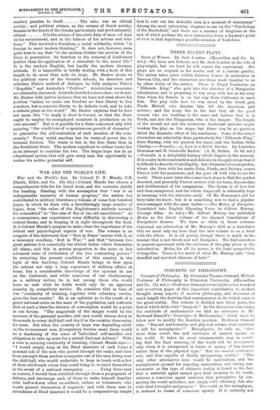WAR AND THE WORLD'S LIFE.
War and the World's Life. By Colonel F. N. Maude, C.B. (Smith, Elder, and Co. 12s. 6d.)—Colonel Mande has chosen a comprehensive title for his latest book, and the contents justify the heading. Starting with the assumption that " war is an indispensable necessity of human progress," the author has contributed to military literature a volume of some four hundred pages, in which he deals with a bewilderingly large number of topics, from " the value of the Englishman's attitude towards his womenkind" to "the rate of fire of the old smoothbore." As a consequence, one experiences some difficulty in discovering a central theme, and in keeping it in sight throughout the book. It is Colonel Maude's purpose to make clear the importance of the ethical and psychological aspects of war. The volume is an exegesis of the statement that " first in Peace' carries with it, as a necessary corollary, first in War,' " and that " between two great nations it is essentially the ethical factor which dominates all others, and this in precise proportion to the more or less advanced state of civilisation of the two contending powers." In reviewing the present condition of this country in the light of this teaching, Colonel Maude brings to bear upon his subject not only a long experience of military affairs at home, but a considerable knowledge of the systems in use on the Continent, and while conscious of our shortcomings as a military nation, he is not among those who would have us seek what he holds would only be an apparent security by compulsory service. He considers that in time of war " continuity of training, together with voluntary service, gives the best results." He is an optimist as to the result of a grave national crisis on the mass of the population, and contends that at such a time the absence of conscription would be a point in our favour. " The magnitude of the danger would be the measure of the personal sacrifice, and men would stream down in thousands to every drill-hall and dep&t in the country clamouring for arms. But when the country at large was depending solely on the Government men (Compulsory Service men) there would be a deadening of the sense of individual self-sacrifice and obligation to take up arms for a united National defence." With a view to securing continuity of training, Colonel Maude says :- " I would simply keep at the Head Quarters of each Corps a nominal roll of the men who passed through the ranks, and raise from amongst them nucleus companies out of the men living near the drill-hall, who would undertake to keep in touch with a few of their old friends whom they could bring to re-enrol themselves
in the event of a national emergency Using these men as centres, I should then establish through them a propaganda of defence, and encourage each of them to make himself familiar with half-a-dozen other ex-soldiers, sailors or volunteers, who would present themselves if required; and with these men in attendance at Head Quarters it would be a comparatively simple task to sort out the desirable men in a moment of emergency." Among the most interesting chapters is one on the " Psychology of the Battlefield," and there are a number of diagrams at the end, of which perhaps the most instructive from a layman's point of view is that depicting a possible invasion of Yorkshire.






























































 Previous page
Previous page